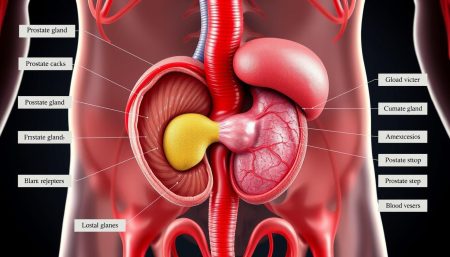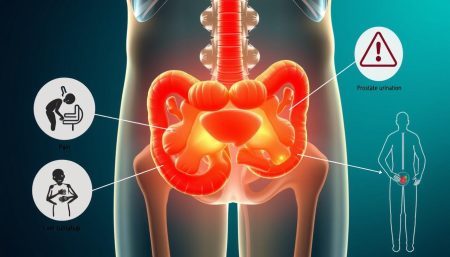What's Hot
- Does Stress Cause Vertigo? Understanding the Connection
- Can an Ear Infection Cause Vertigo | Symptoms Guide
- Can Vertigo Be Related To Stress? Learn The Connection
- Understanding What Is Vertigo Symptoms & Warning Signs
- What Is Vertigo a Symptom Of | Common Causes Explained
- Natural Remedies: What Helps Vertigo & Treatment Tips
- Can Tension Cause Vertigo: Understanding the Connection
- Can High Blood Pressure Cause Vertigo: Explained
Cancer
When we think about removing the prostate gland, cancer is usually the first thing that comes to mind. But, prostate removal isn’t just for cancer. The choice to have prostate cancer surgery depends on many factors and risks.Doctors might suggest…
Prostate cancer is a big worry for men all over the world. Many wonder, “Can you die from prostate cancer?” Thankfully, more men are surviving this disease. But, sadly, some still face a fatal outcome.Knowing about prostate cancer survival rates…
Prostate cancer screening is key to catching it early. This guide covers the different ways to test for prostate cancer. It includes everything from first screenings to detailed tests. Knowing about these tests helps men make smart health choices.Doctors start…
The health of the British royal family is now a big topic. News about King Charles III’s health has worried people all over. Buckingham Palace has confirmed the monarch is sick, revealing a common issue for men.King Charles III’s prostate…
Prostate cancer is a serious health issue that affects many men around the world. It’s important to know what causes it and how to prevent it. This guide will look at the different things that can lead to prostate cancer,…
Prostate cancer is a big worry for men everywhere. This guide will show you how to lower your risk. We’ll look at proven ways, lifestyle changes, and early detection methods to help keep your prostate healthy.We’ll talk about diet, nutrition,…
Prostate cancer is a serious health issue that affects many men globally. It’s important to know the symptoms, risk factors, and screening methods. This helps in early detection and effective treatment. We’ll look into the key aspects of prostate cancer,…
A surprising trend is happening in men’s health. Prostate cancer rates, once seen mainly in older men, are now rising in Gen Z. This change has made doctors and researchers take notice, leading them to study gen z health risks…
Prostate cancer is a big problem for men all over the world. Knowing the early signs is key. By recognizing what are the early signs, men can get help sooner. This can lead to better health outcomes.Prostate cancer symptoms often…
The medical world has been searching for good treatments for prostate cancer for a long time. Finasteride, made for benign prostatic hyperplasia, might be a solution. This study asks: Can finasteride treat prostate cancer?Recent studies have made people think about…
NBA Hall of Famer Bill Walton faced a big health challenge when he got a prostate cancer diagnosis. His journey with this disease made people talk about the importance of catching it early in sports.Walton’s fight with prostate cancer was…
Prostate cancer symptoms are often missed in the early stages. It’s important to recognize these signs early. Men should watch for subtle changes that could mean prostate disease.Finding prostate cancer early can lead to better treatment. Regular health checks and…
Cancer
Cancer is a major health concern worldwide. It’s a disease where malignant cells grow too much. Knowing about cancer can save lives.
It’s important to find cancer early and spread awareness. This helps people survive and manage the disease better. Research is key to finding new treatments and giving hope to those affected.
Understanding cancer is an ongoing journey. With more cancer research, we can improve diagnosis and treatment. Knowledge is as powerful as the treatments themselves.
What is Cancer? Definitions and Types
Understanding cancer starts with knowing about malignant cells. These cells grow out of control, unlike normal cells. This can harm the body and affect many functions.
Defining Cancer and Malignant Cells
Cancer is when abnormal cells grow without control. These cells can spread to other parts of the body. This is called metastasis. It’s what makes malignant tumors different from benign ones.
The Various Forms of Cancer and Common Types
There are over 100 types of cancer. They include carcinoma, melanoma, sarcoma, and lymphoma and leukemia. Each type affects different parts of the body. This shows why treatments must vary.
Recognizing Benign vs. Malignant Tumors
It’s key to know the difference between benign and malignant tumors. Benign tumors grow slowly and stay in one place. Malignant tumors grow fast and can spread to other organs. Knowing this helps doctors choose the right treatment.
Cancer Diagnosis and Staging
The journey to fight cancer starts with a quick and accurate cancer diagnosis. This key step in oncology uses the latest medical tech and expert opinions. Doctors use tests like blood work, imaging, and biopsies to find cancer cells.
After finding cancer, the focus shifts to cancer staging. This step shows how far cancer has spread in the body. It’s crucial for creating a treatment plan that fits each patient. Staging uses scans and sometimes surgery to measure tumors.
Getting a cancer diagnosis is very hard for patients and their families. That’s why support and clear talk are so important. Doctors in oncology do more than treat cancer. They also offer emotional support and help during treatment.
Cancer Treatments: Traditional and Emerging Methods
The way we treat cancer has changed a lot. Old methods like chemotherapy are still important, but now they’re better and safer. New ideas like personalized medicine are making treatments fit each person’s needs. We look at how we fight cancer today, from old ways to new ones.
Chemotherapy: How It Works and What to Expect
Chemotherapy is a key part of fighting cancer. It kills cancer cells fast. But, it can also make people feel very tired or have other serious side effects. Doctors are working to make chemotherapy better, so it hurts less and works better.
Radiation Therapy: The Science and Its Use
Radiation therapy uses high-energy waves to kill cancer cells. New technology makes it more precise, so it hits the tumor but not the healthy tissue. This shows how modern medicine aims to be both effective and gentle.
Innovative Cancer Treatments in Modern Oncology
New treatments are changing cancer care a lot. Gene editing, targeted therapy, and nanotechnology are some of these advances. They help make treatments more personal and less harsh.
Immunotherapy and Personalized Medicine in Cancer Treatment
Immunotherapy helps the body fight cancer itself. It’s a big step towards personalized medicine. This approach makes treatments fit each person’s genes, aiming for better survival and quality of life. Personalized medicine offers hope for everyone fighting cancer.
FAQ
Q: What exactly is cancer?
A: Cancer is a disease where cells grow out of control. These cells can spread to other parts of the body. Unlike normal cells, cancer cells keep growing and can harm healthy tissue.
Q: How do cancer cells differ from normal cells?
A: Cancer cells grow without stop signals and avoid death signals. They can trick the body into giving them nutrients. They can also spread to other organs.
Q: Why is cancer awareness important?
A: Knowing about cancer helps find it early. This can lead to better treatment and survival chances. Awareness also helps fund research for new treatments.
Q: What are the most common types of cancer?
A: Common cancers include breast, lung, prostate, colorectal, and skin cancer. But there are over 100 types of cancer.
Q: How can I tell the difference between a benign and malignant tumor?
A: Benign tumors are noncancerous and don’t spread. Malignant tumors are cancerous and can spread. Benign tumors grow slowly, while malignant tumors grow fast.
Q: What is involved in a cancer diagnosis?
A: Diagnosing cancer involves medical history, physical exams, and tests like CT scans and MRIs. Blood tests and biopsies are also used. These help confirm cancer and its type.
Q: What does cancer staging mean?
A: Staging describes the cancer’s size and spread. It helps doctors plan treatment and predict outcomes. Stages range from 0 to 4, with higher numbers indicating more advanced cancer.
Q: How does chemotherapy work?
A: Chemotherapy kills fast-growing cells, like cancer cells. It can be given orally or through an IV. It can harm healthy cells too, causing side effects.
Q: What is radiation therapy and how is it used in cancer treatment?
A: Radiation therapy kills cancer cells with high doses of radiation. It damages DNA in cancer cells, stopping them from reproducing. It can be given externally or internally.
Q: What are some of the emerging treatments in modern oncology?
A: New treatments include targeted therapy and immunotherapy. Targeted therapy attacks cancer cells specifically. Immunotherapy boosts the body’s immune system to fight cancer.
Q: How does personalized medicine impact cancer treatment?
A: Personalized medicine tailors treatment to an individual’s cancer. It uses genetic information to find the most effective treatments. This can lead to better results with fewer side effects.
Q: Can lifestyle choices affect cancer risk?
A: Yes, lifestyle choices can impact cancer risk. Smoking, alcohol, unhealthy diet, and lack of exercise increase risk. Healthy habits like a balanced diet and exercise can lower risk.
Q: What can be done to prevent cancer?
A: Preventing cancer involves making healthy lifestyle choices. Quit smoking, eat well, stay active, and protect your skin. Screenings and vaccines, like the HPV vaccine, can also help prevent cancer.























